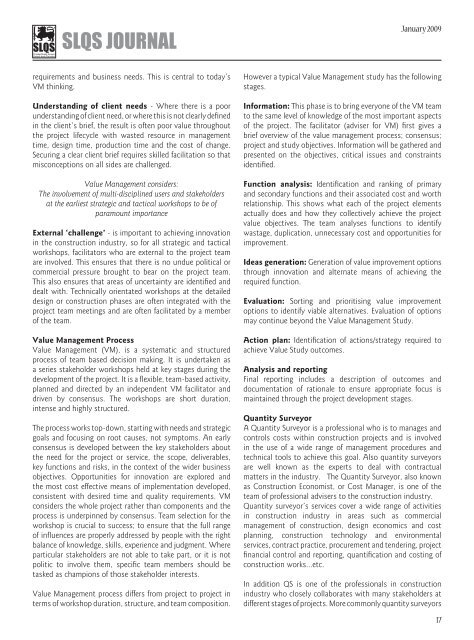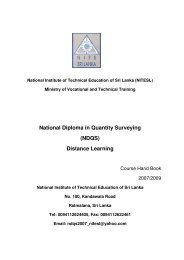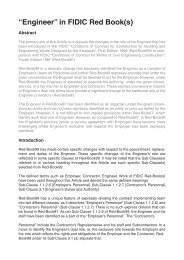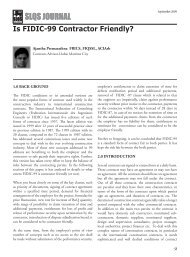SLQS-Journal Vol. 1 - Slqs-uae.org
SLQS-Journal Vol. 1 - Slqs-uae.org
SLQS-Journal Vol. 1 - Slqs-uae.org
You also want an ePaper? Increase the reach of your titles
YUMPU automatically turns print PDFs into web optimized ePapers that Google loves.
<strong>SLQS</strong> JOURNALJanuary 2009requirements and business needs. This is central to today’sVM thinking.Understanding of client needs - Where there is a poorunderstanding of client need, or where this is not clearly definedin the client’s brief, the result is often poor value throughoutthe project lifecycle with wasted resource in managementtime, design time, production time and the cost of change.Securing a clear client brief requires skilled facilitation so thatmisconceptions on all sides are challenged.Value Management considers:The involvement of multi-disciplined users and stakeholdersat the earliest strategic and tactical workshops to be ofparamount importanceExternal ‘challenge’ - is important to achieving innovationin the construction industry, so for all strategic and tacticalworkshops, facilitators who are external to the project teamare involved. This ensures that there is no undue political orcommercial pressure brought to bear on the project team.This also ensures that areas of uncertainty are identified anddealt with. Technically orientated workshops at the detaileddesign or construction phases are often integrated with theproject team meetings and are often facilitated by a memberof the team.Value Management ProcessValue Management (VM), is a systematic and structuredprocess of team based decision making. It is undertaken asa series stakeholder workshops held at key stages during thedevelopment of the project. It is a flexible, team-based activity,planned and directed by an independent VM facilitator anddriven by consensus. The workshops are short duration,intense and highly structured.The process works top-down, starting with needs and strategicgoals and focusing on root causes, not symptoms. An earlyconsensus is developed between the key stakeholders aboutthe need for the project or service, the scope, deliverables,key functions and risks, in the context of the wider businessobjectives. Opportunities for innovation are explored andthe most cost effective means of implementation developed,consistent with desired time and quality requirements. VMconsiders the whole project rather than components and theprocess is underpinned by consensus. Team selection for theworkshop is crucial to success; to ensure that the full rangeof influences are properly addressed by people with the rightbalance of knowledge, skills, experience and judgment. Whereparticular stakeholders are not able to take part, or it is notpolitic to involve them, specific team members should betasked as champions of those stakeholder interests.Value Management process differs from project to project interms of workshop duration, structure, and team composition.However a typical Value Management study has the followingstages.Information: This phase is to bring everyone of the VM teamto the same level of knowledge of the most important aspectsof the project. The facilitator (adviser for VM) first gives abrief overview of the value management process; consensus;project and study objectives. Information will be gathered andpresented on the objectives, critical issues and constraintsidentified.Function analysis: Identification and ranking of primaryand secondary functions and their associated cost and worthrelationship. This shows what each of the project elementsactually does and how they collectively achieve the projectvalue objectives. The team analyses functions to identifywastage, duplication, unnecessary cost and opportunities forimprovement.Ideas generation: Generation of value improvement optionsthrough innovation and alternate means of achieving therequired function.Evaluation: Sorting and prioritising value improvementoptions to identify viable alternatives. Evaluation of optionsmay continue beyond the Value Management Study.Action plan: Identification of actions/strategy required toachieve Value Study outcomes.Analysis and reportingFinal reporting includes a description of outcomes anddocumentation of rationale to ensure appropriate focus ismaintained through the project development stages.Quantity SurveyorA Quantity Surveyor is a professional who is to manages andcontrols costs within construction projects and is involvedin the use of a wide range of management procedures andtechnical tools to achieve this goal. Also quantity surveyorsare well known as the experts to deal with contractualmatters in the industry. The Quantity Surveyor, also knownas Construction Economist, or Cost Manager, is one of theteam of professional advisers to the construction industry.Quantity surveyor’s services cover a wide range of activitiesin construction industry in areas such as commercialmanagement of construction, design economics and costplanning, construction technology and environmentalservices, contract practice, procurement and tendering, projectfinancial control and reporting, quantification and costing ofconstruction works...etc.In addition QS is one of the professionals in constructionindustry who closely collaborates with many stakeholders atdifferent stages of projects. More commonly quantity surveyors17





